Creating To Do Lists In WordPress
 There is never enough time to get things done, especially if you are a business owner.
There is never enough time to get things done, especially if you are a business owner.
There is just too much to do and remember. You have so many deadlines to meet, tasks to complete, priorities to attend to, fires to put out, calls and appointments to make, commitments to keep and so on. The amount of things that need ”doing” never seems to end.
Now … add the extra dimension of trying to promote and grow your business online and keeping your website updated with new content and things can start to become unmanageable and overwhelming.
Whether you are running a business, website, blog, or managing a team, it’s important to be able to organize and manage your daily tasks.
One ”tried and true” method that can help you save time, create a sense of order and manageability, and allow you to regain control is to use “to-do” lists.
To-Do Lists – Benefits
A “to do” list can help you measure your progress as you to get projects completed. Your to do list can be minutely detailed and specific, or just serve as a concise reminder of what needs to be done over a given period of time.
Here are some of the benefits of using to do lists:
See Things More Clearly
Creating a to do list means you won’t have to keep remembering things or store information inside your head. Once tasks are jotted down on a to do list, your head is free to process other information and you can focus on things that are more important to you.
Better Strategic Planning
Creating and organizing to do lists helps you see the larger picture and come up with a strategic plan for getting tasks completed efficiently.
Quickly Reorganize And Reschedule
To-do lists help you better deal with situations. If you suddenly find that an appointment has been cancelled at the last minute or extra time is made available when some task gets completed sooner than expected, you can quickly reorganize and reschedule and keep working with little to no loss of focus.
Reduce Stress
Stress can come from feeling overwhelmed by so much to do and so little time to do it in. Using to do lists allow you to prioritize important tasks that have to be completed immediately, and push out non-urgent tasks that can be worked on later. This can help reduce the feeling of being overwhelmed and alleviate some of the stress you (and your team) may be feeling.
Feeling Of Accomplishment
Ticking items off to do lists not only helps you feel more productive, motivated and in-control, it also allows you to stress less, as you can objectively see (or show) that work is indeed getting done and that milestones are being reached.
As you can see, there are many benefits to using to-do lists, both in business and in your personal life. Creating to-do lists, prioritizing tasks and working in a focused way improves efficiency and productivity in your business.
What about adding a to-do list to your WordPress website?
In this step-by-step tutorial we are going to show you how to easily create to-do lists in WordPress to help your business grow online faster and more efficiently using a customizable, multi-featured to do list WordPress plugin called Cleverness To-Do List.
Cleverness To Do List
Download The Plugin
http://wordpress.org/plugins/cleverness-to-do-list/
Plugin Description
This plugin lets you easily add a customizable to-do list to a WordPress site.
Features
Note: the plugin features listed below will be discussed in more detail in the tutorial section.
You can configure the plugin with private to-do lists for individual users, to have all users share your to-do list, or to have a master list with individual item completions.
The shared to-do list option provides a number of settings. You can delegate to do items to specific users (this includes emailing a new to do item to assigned users) and optionally to have assigned items only seen by that user. You can also assign different permission levels to different users. There are also settings to display deadline and progress fields. Category support is also included as front-end administration.
A new menu item is added to the backend to help you manage your lists and your to-do lists can also be displayed on the dashboard widget.
A sidebar widget is available as well as short code to display the to do list items on your blog. There are two short codes for front-end list administration. Management of categories is accessible through the back-end.
If you plan to run a multi-author site you can use this to-do lists plugin to create custom to do lists for your post editors if you also install a copy of the developer’s premium plugin, Post Planner.
How To Install The Cleverness To-Do List Plugin
Log into your site’s dashboard area, and select Plugins > Add New …
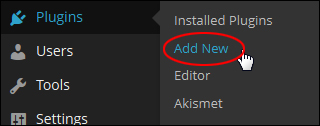
In the Install Plugins screen, type in “cleverness” into the search field and hit the Enter button …
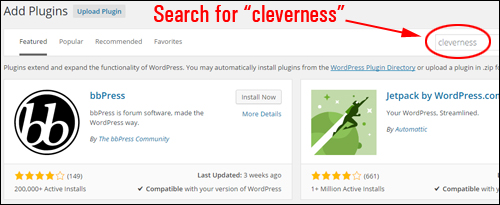
Locate the Cleverness To-Do List plugin in the Search Results section and click Install Now …
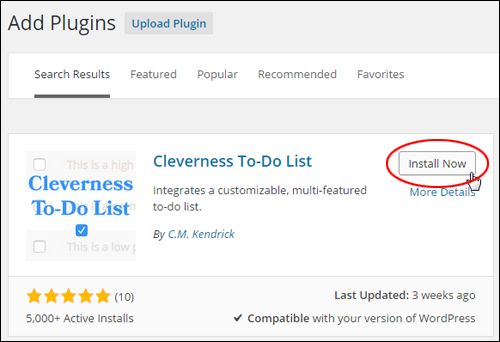
Activate the plugin after installing it …
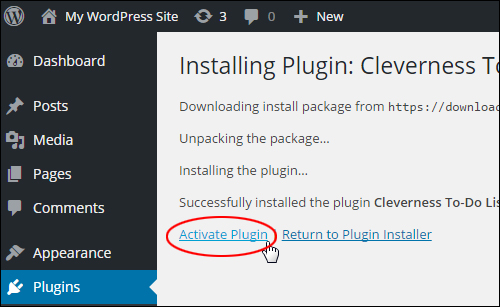
Note: You can also activate the plugin in the Plugins section …

Once you have activated the plugin, click on Settings …

Note: The plugin’s settings section can also be accessed by selecting To-Do List > Settings from the dashboard menu …

This brings you to the ‘Settings’ screen …

The section below shows you how to go through the plugin configuration process …
Setting Up The Plugin
The Settings screen is divided into 4 tabs:
- To-Do List Settings – The options in this tab let you specify the plugin’s main settings.
- Advanced Settings – This area lets you customize to-do lists, assign to-do items to other users and perform plugin database maintenance tasks.
- User Permissions – Here you can set up user permissions and capabilities for Group and Master List types.
- Import/Export – The options in this area let you import and export to-do list data and plugin settings.
Let’s review each of these tabs.
To-Do List Settings
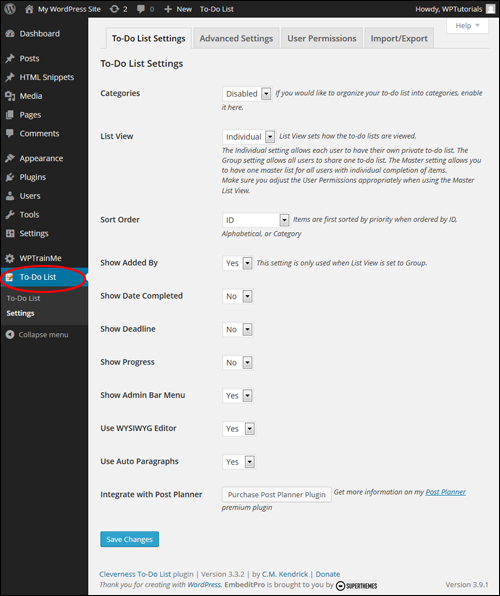
To-Do List Categories
Choose ‘Enabled’ to organize lists into categories, otherwise leave this option set to ‘Disabled’.
Note: When you enable this option, a ‘Categories’ item is added to the To-Do List menu …
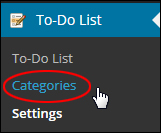
This lets you add categories that can help organize your lists (see ‘Plugin Usage’ section further below for more details) …
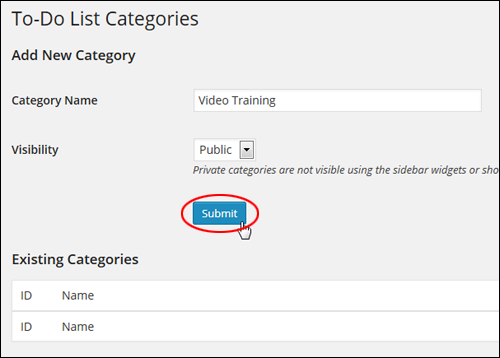
You can create ‘public’ and ‘private’ categories for your to-do lists.
Private categories are not visible when using widgets or shortcodes (only when ‘Sort Order’ is set to ‘Category’)
List View
List View lets you specify how to-do lists will be viewed. There are three types of list views:
- Individual – Choose this option if you want each user to create and manage their own private to-do list.
- Group – Select this option if you want all users to share the same to-do list.
- Master – This option allows you to have a master list for all users, where users have their own individual items to complete. If you choose the ‘Master’ list view, make sure to set the User Permissions appropriately in the ‘User Permissions’ tab (this is covered further below).
Sort Order
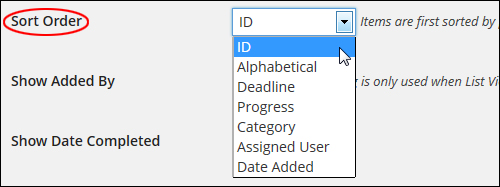
‘Sort Order’ lets you specify how list items will be sorted.
If you select Category, Alphabetical or ID, Category, ID or Alphabetical options, items will be sorted first by priority.
Show Added By
Enabling this option lets you display which of your members has added an item to the to-do list.
Note: This setting only works when ‘List View’ is set to ‘Group’.
Show Date Completed
If this option is enabled, completion dates will display for to-do items.
Show Deadline
If this option is enabled, you can specify deadlines for your to-do tasks …
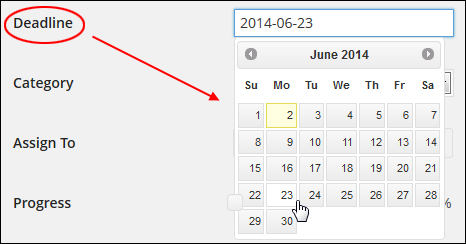
Show Progress
If this option is enabled, you will be able to specify task progress indicators for your to-do items …

Show Admin Bar Menu
Enabling this option (‘Yes’) lets you display the ‘To-Do List’ menu in your WordPress Admin bar …

Use WYSIWYG Editor
This menu option lets you add and edit items on your to-do list using the WordPress WYSIWYG Editor …
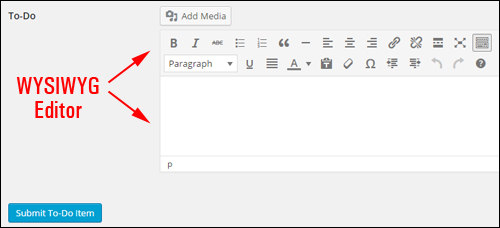
Use Auto Paragraphs
If this option is enabled, automatic paragraphs are used to display content in your to-do lists.
Integrate with Post Planner
If you plan to run a collaborative website or blog, you can integrate the Cleverness To Do List plugin with a plugin called WordPress Post Planner, from the same developer that helps to make the task of managing a multi-author WordPress site easier …
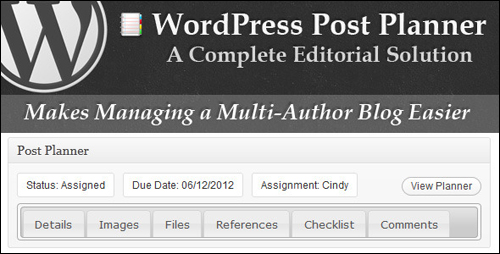
To learn more this WordPress plugin, go here: WordPress Post Planner – Multi-Author Publishing Plugin For WordPress
After you have finished configuring your options, click the ‘Save Changes’ button …

Advanced Settings
After configuring the general settings, click on the ‘Advanced Settings’ tab …

This brings up the ‘Advanced Settings’ section …
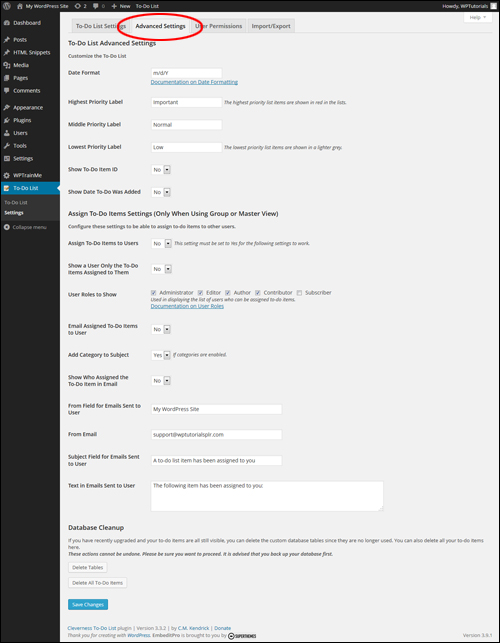
In this area you can customize your To-Do lists, assign to-do items to users and perform plugin database maintenance tasks.
Let’s take you through how to configure the plugin’s ‘Advanced Settings’ section …
To-Do List Advanced Settings > Customize The To-Do List
In this area you can customize your To Do List …
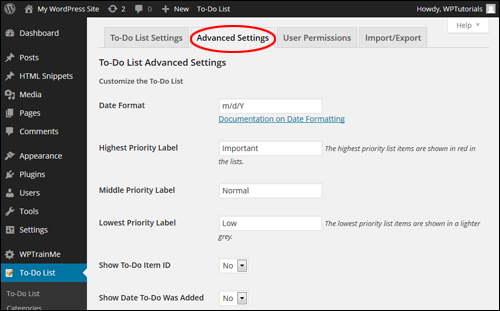
You can configure the following options in this section:
Date Format
This section lets you specify how to display dates in your to-do list (e.g. month/day/year, day/month/year, etc.)
Note: To learn more about formatting dates in WordPress, see the date section of the WordPress Codex below:
WordPress Codex – Formatting Date And Time
Priority Labels
This section lets you customize labels for highest (important), middle and low priority items …

Items prioritized as “important” are shown in red in your lists and lowest priority items display in a lighter shade of grey …
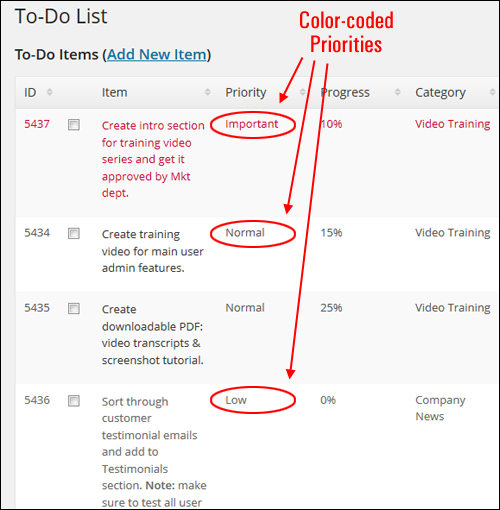
Show To-Do Item ID
If enabled (‘Yes’), item IDs appear on the to-do list …
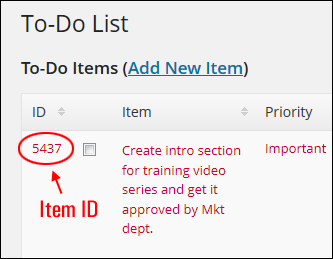
Show Date To-Do Was Added
If enabled (‘Yes’), the date the to-do list was added displays on your To-Do Items table …
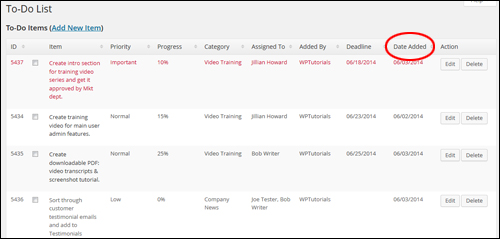
To-Do List Advanced Settings > Assign To-Do Items Settings
If you have chosen either ‘Group’ or ‘Master’ View for your to-do list, you can configure the settings in this section and assign items to other users …
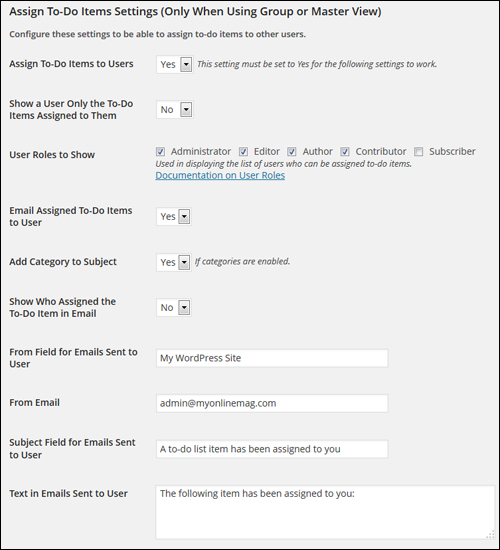
You can configure the following options in this area:
Assign To-Do Items to Users
If enabled, you can assign to-do items to other users …
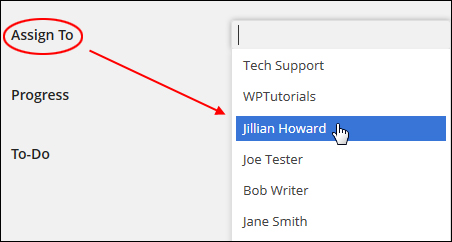
Note: This setting must be set to ‘Yes’ for the settings below it to work.
Show a User Only the To-Do Items Assigned to Them
If enabled (‘Yes’), you can display items only to users who have been assigned those items. Leave this option disabled (‘No’) to display items to all users.
User Roles to Show
Checking the boxes in this section Subscriber) displays the type of users that can be assigned to-do items. If you don’t want to assign to-do items to a particular role, then leave its check box unticked.
Email Assigned To-Do Items to User
If this option is enabled, WordPress automatically sends an email to users with their assigned to-do items …
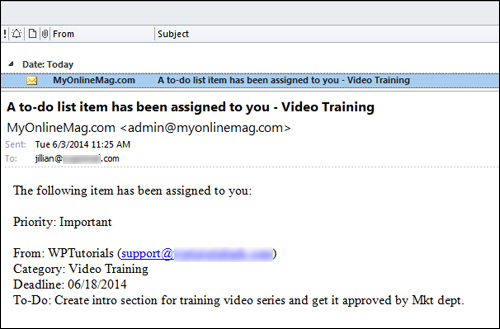
Leave this option disabled if you don’t want to send out emails to users.
Note: If you disable this option, skip the other settings in this section.
Add Category to Subject
If categories are enabled in your plugin settings and you have selected ‘Yes’ for this option, the to-do category will display in the subject of emails sent to users …
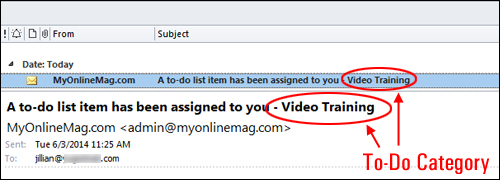
Leave this option disabled (‘No’) if you don’t want categories to show the subject of your emails.
Leave this option disabled if you don’t want to-do categories to show the subject of your emails.
Show Who Assigned the To-Do Item in Email
If enabled, you can display the user who assigned the to-do item in the email. This is a useful option if you have several project managers assigning to-do items to users …

From Field for Emails Sent to User
This field lets you customize the “From” field when sending out email notifications to users. Type the name of your company, your domain, your name, or anything you like into this field …

From Email
In this field, enter the email address that you would like displayed as the “sent from” address …

Subject Field for Emails Sent to User
Type into this field a subject field for the email that will be automatically sent out to users whenever a new item has been assigned to your to-do list …

Text in Emails Sent to User
Enter the body of the email message that will be sent out automatically to users when a new item has been assigned to your to-do list.

To-Do List Advanced Settings > Database Cleanup
In this section you can carry out database maintenance operations associated with plugin data directly from your plugin settings area itself …

This is useful if, for example, you see that old items are still listed on your site.
The following tasks can be performed in this section:
- Delete Tables – Delete any custom database tables that you no longer use.
- Delete All To-Do Items – Erase all to-do items.
![]()
Actions that you perform on your database from this screen cannot be undone. If you are comfortable to proceed with any of the database operations available in this section, then we recommend backing up your WP database first.
If you don’t want to back up your site yourself, then consider getting support from a WordPress professional, or use WordPress backup plugins. You can read about a great WordPress backup plugin that we recommend using to automate backups here:
User Permissions
This section lets you configure user permissions and capabilities for Group or Master List types …

![]()
If you are using the Individual List type, the only configurable option that applies in this section is the View To-Do List permission …
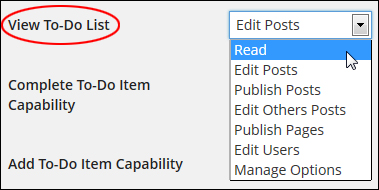
If you are configuring user permissions and capabilities for Group and Master List types, select the highest level capabilities that you would like users to be able to perform for each option …
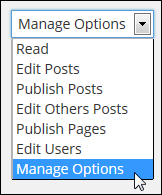
By default, general capabilities for each user role are set as follows:
- Subscribers: Read
- Contributors: Edit Posts
- Authors: Publish Posts
- Editors: Edit Others Posts
- Administrators: Manage Options
Note: When using the Master list type make sure that you only authorize non-administrator users to view and complete items, otherwise they will be able to edit the Master list.
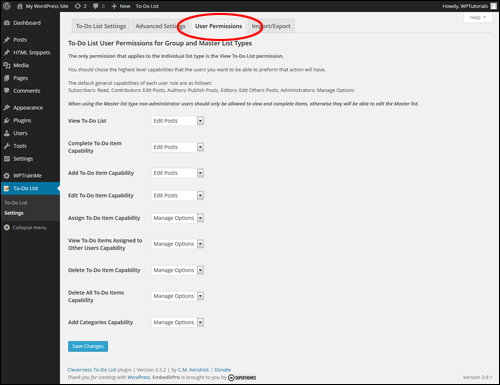
Let’s review the settings for this tab:
View To-Do List
This setting enables the selected capability to view items in the dashboard widget and on the To-Do List page under the ‘Tools’ section.
Complete To-Do Item Capability
Here you can permit the selected capability to mark items as completed or uncompleted.
Add To-Do Item Capability
This option enables the chosen capability to add new items.
Edit To-Do Item Capability
Here you can allow the chosen capability to modify existing to-do items.
Assign To-Do Item Capability
This setting allows the chosen capability to delegate to-do items to individual users.
View All Assigned Tasks Capability
This setting allows the chosen capability to view all tasks even if “Show Each User Only Their Assigned Tasks” is set to ‘Yes’.
Delete To-Do Item Capability
This option enables the selected capability to delete individual items.
Delete All To-Do Items Capability
This option enables the selected capability to purge all the completed items.
Add Categories Capability
Here you can enable the chosen capability to add new categories.
Import/Export
The ability to import and export to-do list data can be very useful. For example, you may need to transfer data from an existing to-do list to another website, or store the list data for backup or reporting purposes.
To access this function, click on the ‘Import/Export’ tab in your plugin settings area …

Now you can export and import your to-do list data and plugin settings …
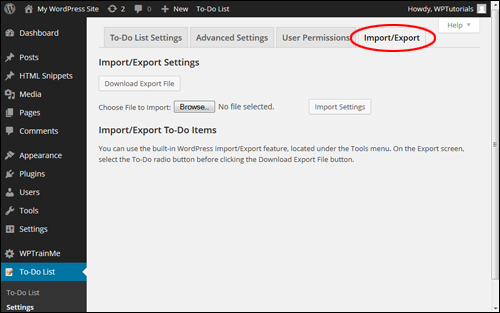
Exporting To-Do List Data
You can export and download your list data settings by clicking on the ‘Download Export File’ …

This opens up a new window allowing you to download and save your data as plain text to a storage device …
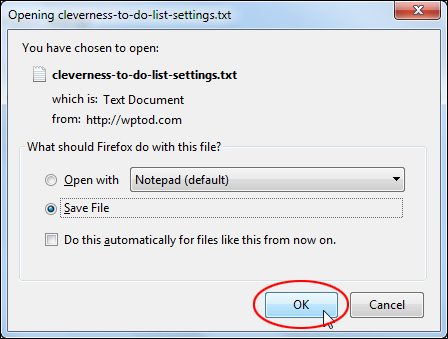
In addition to exporting list data from the ‘Import/Export’ section, you can also export data by going to your WordPress dashboard menu and selecting Tools > Export …
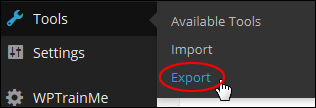
You can include to-do list data in an export file (in XML format), either by checking ‘All content’ (includes everything – posts, pages, etc…), or selecting ‘To-Do’ from the ‘Choose what to export’ section and clicking the ‘Download Export File’ button to download your file to a storage medium…
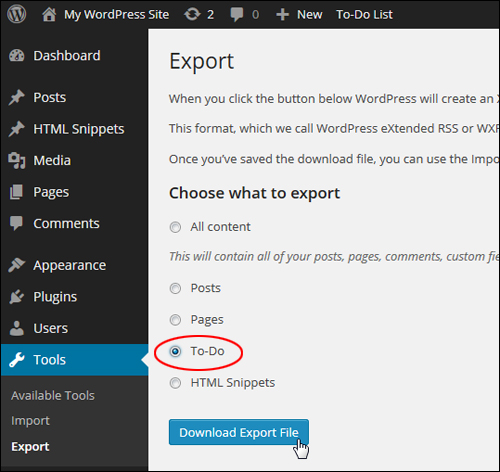
Importing To-Do List Data
To import a previously saved to-do list data file, click on the ‘Browse’ button next to the ‘Choose File to Import’ field …

Locate the previously saved to-do list data file and click ‘Open’ …
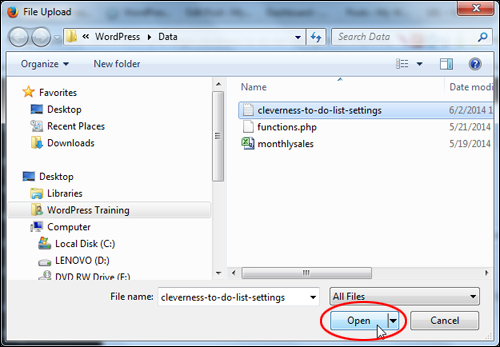
After your data file has been uploaded to your settings area, click the ‘Import Settings’ button …

Your file data will be imported.
Now that you have configured all of the plugin settings, you can begin create and edit your lists.
Plugin Usage
To create a new to do list, log into your WordPress dashboard, then scroll down the menu and click on To-Do List > To-Do List …
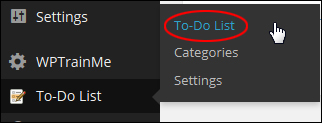
This brings you to the ‘To-Do List’ page …
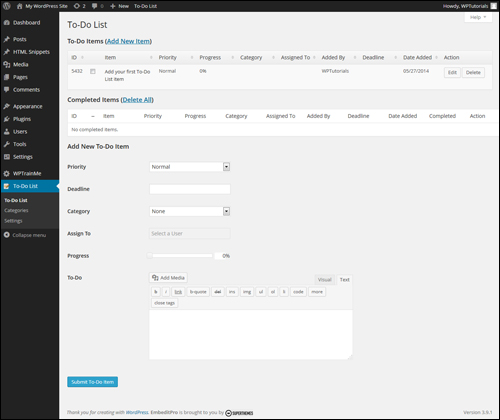
Add New To Do Items
There are several ways to add a new item to your to-do list.
For example, you can add new to-do items from your WP admin toolbar …

You can also add new to-do items to your list from the ‘To-Do List’ dashboard section by clicking on the ‘Add To-Do item’ link …
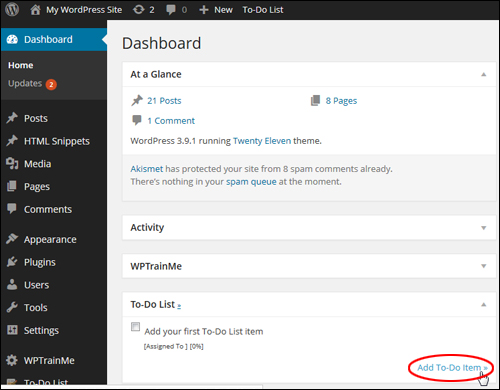
You can click on the ‘Add New Item’ link in the ‘To-Do Items’ section (note: only use this option if your To-Do list already contains many items, as the link will simply take you to the “Add New To-Do Item” section further down the page) …

All the above methods will take you to the ‘Add New To-Do Item’ area.
Depending on how you have set up your plugin, you may or may not see certain options displayed when new items to your to-do list.
Configure the options you have enabled for your to-do items, add appropriate information into the relevant fields and click on the ‘Submit To-Do Item’ button to add the new to-do item …
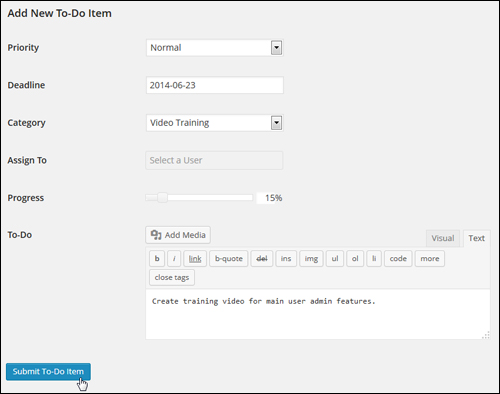
Note: If you have chosen a list type that lets you assign responsibilities over items to users, select a user from the drop-down list and assign them the item …
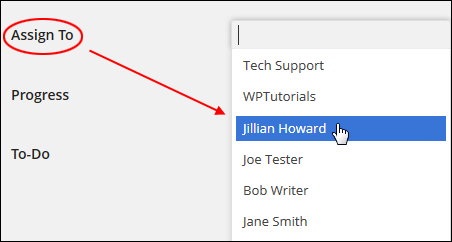
You can also make multiple users responsible for the same item (click on ‘x’ to delete users) …

Once a new item has been added, it will be listed as an entry in the ‘To-Do List’ table …

Repeat this process to continue adding new items to your to-do list …
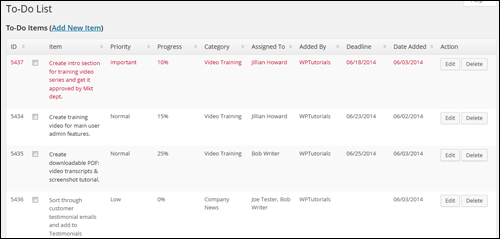
Editing And Deleting To-Do Items From Your List
To edit or delete an item, click on the ‘Edit’ or ‘Delete’ buttons next to each item under the ‘Action’ column …

Depending on how you have set up the plugin (see previous section), users assigned to tasks may also receive email notifications …
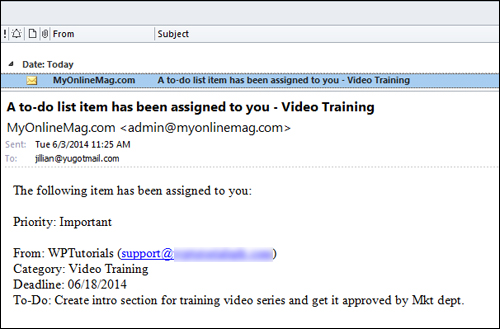
Once you have created your to-do list, users can view it from their user dashboard …
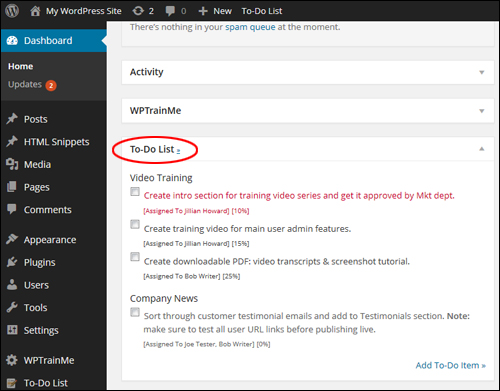
When users assigned with an item complete the task and click on the item check box …
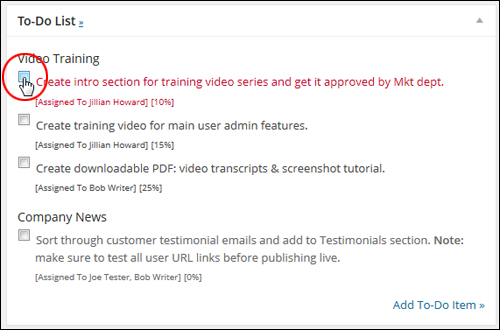
… the item is then deleted from the “To-Do” list …
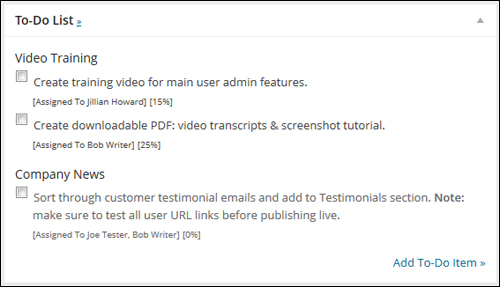
And displays in the ‘Completed Items’ section located in the main screen of the ‘To-Do List’ plugin …

Additional Information
The Cleverness plugin offers added functionality that lets you display a to-do list on your WordPress website using widgets, and display lists on content inside a post or page using shortcodes.
Plugin Widget
To add to-do lists to your site using widgets, go to the ‘Widgets’ page (Appearance > Widgets) and drag the ‘To-Do List’ widget to the menu location where you would like the list to appear …

Configure the widget settings and click the ‘Save’ button …
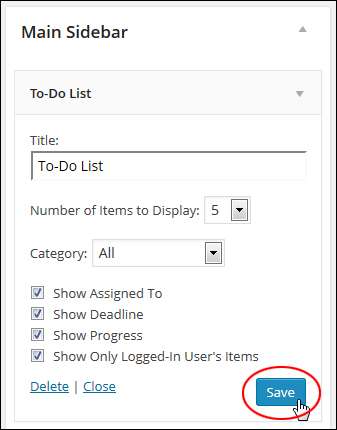
The list will display where the widget was added (i.e. the sidebar menu, footer, etc.)
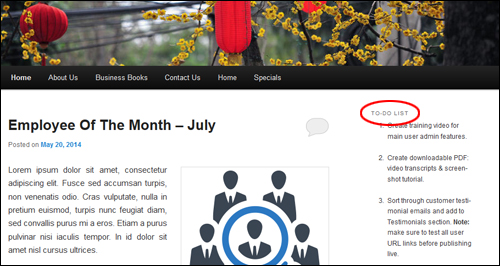
To learn more about using WordPress widgets, see the tutorial below:
Using The Cleverness Plugin Short Codes
The Cleverness To-Do List plugin also lets you display to-do lists on your site by placing short codes into your content.
To access the documentation on using shortcodes, select To-Do List > To-Do List from your dashboard menu …
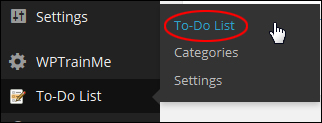
Click the ‘Help’ tab on the corner of your screen …
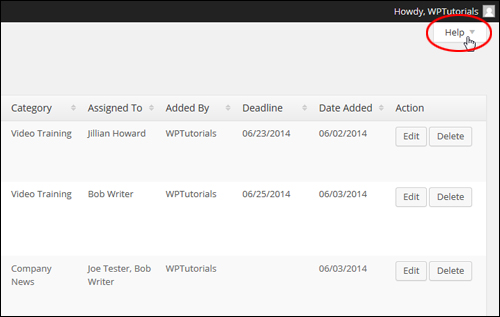
Click on the ‘Shortcodes’ menu entry to access the Shortcode Documentation section …
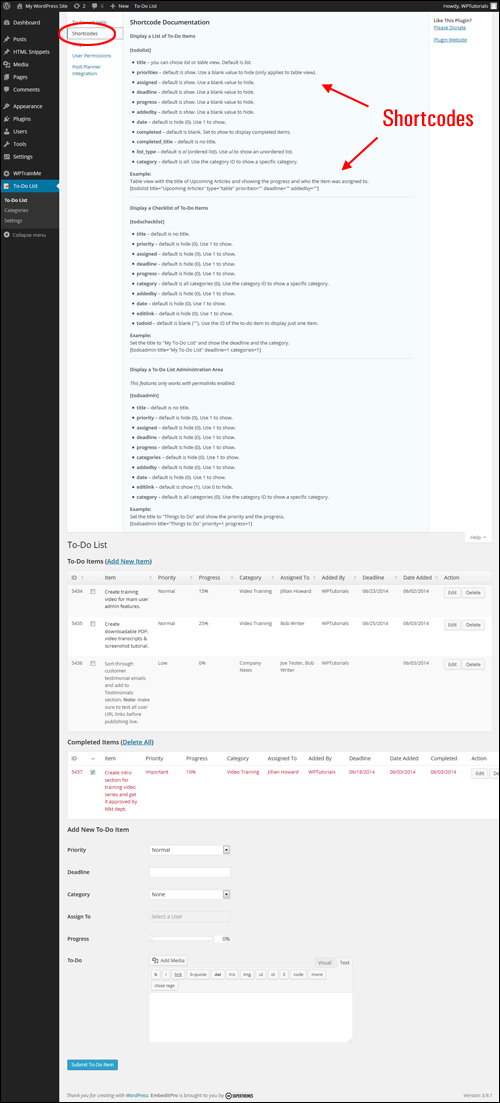
The documentation section explains different ways to configure and use short codes to display lists on your content.
Once you know what information you want to add to your site, create or edit a new or existing page or post and either type or paste the shortcode into the content area …
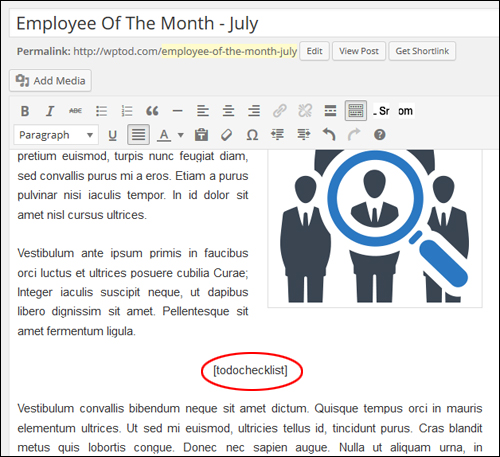
After publishing your page or post, you should see the list displayed where you have inserted the short code …
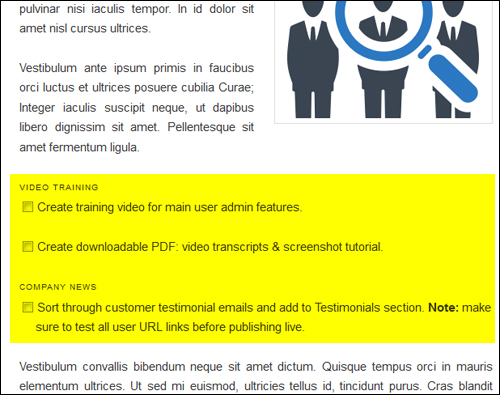
For more details about this plugin, visit the plugin website:
Congratulations! Now you can add to-do lists to your WordPress site.
***
"I have used the tutorials to teach all of my clients and it has probably never been so easy for everyone to learn WordPress ... Now I don't need to buy all these very expensive video courses that often don't deliver what they promise." - Stefan Wendt, Internet Marketing Success Group
***

